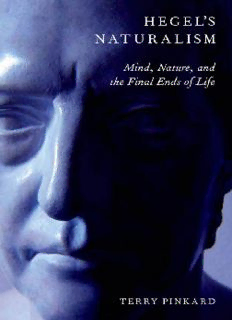
Hegel's Naturalism: Mind, Nature, and the Final Ends of Life PDF
Preview Hegel's Naturalism: Mind, Nature, and the Final Ends of Life
Hegel’s Naturalism This page intentionally left blank Hegel’s Naturalism Mind, Nature, and the Final Ends of Life T ERRY P INKARD 1 3 Oxford University Press, Inc., publishes works that further Oxford University’s objective of excellence in research, scholarship, and education. Oxford New York Auckland Cape Town Dar es Salaam Hong Kong Karachi Kuala Lumpur Madrid Melbourne Mexico City Nairobi New Delhi Shanghai Taipei Toronto With offi ces in Argentina Austria Brazil Chile Czech Republic France Greece Guatemala Hungary Italy Japan Poland Portugal Singapore South Korea Switzerland Th ailand Turkey Ukraine Vietnam Copyright © 2012 Oxford University Press Published by Oxford University Press, Inc. 198 Madison Avenue, New York, New York 10016 www.oup.com Oxford is a registered trademark of Oxford University Press All rights reserved. No part of this publication may be reproduced, stored in a retrieval system, or transmitted, in any form or by any means, electronic, mechanical, photocopying, recording, or otherwise, without the prior permission of Oxford University Press. Library of Congress Cataloging-in-Publication Data Pinkard, Terry P. Hegel’s naturalism : mind, nature, and the fi nal ends of life / Terry Pinkard. p. cm. ISBN 978-0-19-986079-1 (hardcover : alk. paper) 1. Hegel, Georg Wilhelm Friedrich, 1770–1831. I. Title. B2948.P457 2012 193—dc23 2011018598 1 3 5 7 9 8 6 4 2 Printed in the United States of America on acid-free paper To Susan This page intentionally left blank CONTENTS Acknowledgments ix Preface xi Introduction 3 PART ONE 1. Disenchanted Aristotelian Naturalism 17 A: HEGEL’S ARISTOTELIAN TURN 17 1: Animal Life 23 2: The Inwardness of Animal Life 25 B: FROM ANIMAL SUBJECTIVITY TO HUMAN SUBJECTIVITY 27 C: ANIMAL LIFE AND THE WILL 30 2. Self-Consciousness in the Natural World 45 A: ANIMAL AND HUMAN AWARENESS 45 B: CONSCIOUSNESS OF THE WORLD 49 C: SELF-CONSCIOUSNESS 53 1: Being at Odds with Oneself in Desire 5 3 2: The Attempt at Being at One with Oneself as Mastery over Others 6 2 3: Masters, Slaves, and Freedom 64 4: The Truth of Mastery and Servitude 69 5: Objectivity, Intuition, and Representation 7 1 viii Contents PART TWO 3. Th e Self-Suffi cient Good 89 A: ACTUALIZED AGENCY. THE SUBLATION OF HAPPINESS 89 B: THE ACTUALLY FREE WILL 94 C: THE IMPOSSIBILITY OF AUTONOMY AND THE “IDEA” OF FREEDOM 1 01 D: BEING AT ONE WITH ONESELF AS A SELF-SUFFICIENT FINAL END 106 4. Inner Lives and Public Orientation 115 A: FAILURE IN FORMS OF LIFE 115 B: THE PHENOMENOLOGY OF A FORM OF LIFE 118 C: GREEK TENSIONS, GREEK HARMONY 120 D: EMPIRE AND THE INNER LIFE 1 26 5. Public Reasons, Private Reasons 135 A: ENLIGHTENMENT AND INDIVIDUALISM 1 35 B: MORALITY AND PRIVATE REASONS 138 C: ETHICAL LIFE AND PUBLIC REASONS 1 42 6. Th e Inhabitability of Modern Life 147 A: ALIENATION 147 1: Diderot’s Dilemma 1 48 2: Civil Society and the Balance of Interests 153 3: Making the Sale and Getting at the Truth 155 B: POWER. THE LIMITS OF MORALITY IN POLITICS 158 1: Bureaucratic Democracy? 1 61 2: The Nation-State? 1 64 7. Conclusion: Hegel as a Post-Hegelian 173 A: SELF-COMPREHENSION 1 73 1: Hegelian Amphibians 1 74 2: Second Nature and Wholeness 1 83 B: FINAL ENDS? 1 87 Bibliography 203 Index 211 ACKNOWLEDGMENTS Th e book has, I am sure, many shortcomings. It would have had even more except for the help I received from several people who read earlier versions of it. Parts of the book are now very diff erent from the manuscript they read precisely because of the questions they raised and the suggestions they made. In particular, I would like to thank Th omas Kuhrana, Charles Larmore, Katie Padgett-Walsh, Robert Pippin, Sally Sedgwick, Martin Shuster, and Christopher Yeomans for their com- ments and discussions. I also benefi ted from discussion with Daniel Warren and Hannah Ginsborg about some of the issues at stake. Georgetown University and the Department of Philosophy provided both a good working environment and the sabbatical that made writing this book pos- sible. In addition, I owe a debt of gratitude to the Wissenschaftskolleg zu Berlin for providing me with a year under their auspices. Reinhart Meyer-Kalkus was a valuable conversation partner about the topics discussed here. I also wish to thank my long-standing philosophical discussion partner, Stan Sechler, for his comments and suggestions. Susan Pinkard’s comments and discussions were irreplaceable. ix
Description: